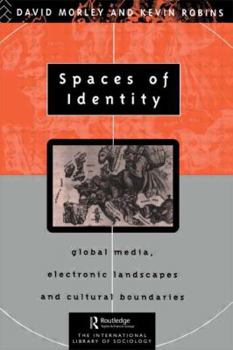Spaces of Identity: Global Media, Electronic Landscapes and Cultural Boundaries
Select Format
Select Condition 
Book Overview
We are living through a time when old identities - nation, culture and gender are melting down. Spaces of Identity examines the ways in which collective cultural identities are being reshaped under conditions of a post-modern geography and a communications environment of cable and satellite broadcasting. To address current problems of identity, the authors look at contemporary politics between Europe and its most significant others: America; Islam...
Format:Paperback
Language:English
ISBN:0415095972
ISBN13:9780415095976
Release Date:July 1995
Publisher:Routledge
Length:264 Pages
Weight:0.96 lbs.
Dimensions:0.8" x 6.2" x 9.2"
Customer Reviews
1 rating
The British view of television imperialism
Published by Thriftbooks.com User , 23 years ago
In many ways this book didn't connect to me, because it has a powerful British perspective that fails to relate other readers to the material. Nonetheless, it is a well-written and much-needed analysis of the impact of media on the "global village." The problem of mis-representations and of misappropriation of the right to represent other cultures comes through clearly with effective research to support the claims. It is particularly effective now, after the collapse of the World Trade Center Towers in the US which I watched on TV in Cairo, Egypt. The local news channel carried the CNN footage with local announcers explaining the events in Arabic. The monopoly of US news media is all the more obvious as I read this book with its discussions about the Gulf War being an extension of Orientalism -- where Saddam Hussein is demonized for his "inherent irrationality" and the "armies of Reason" must then suppress "the crazed monstrous Unreason." "The media then allowed a kind of para-social, thrilled involvement in the obliteration of the monstrous Other." This demonisation of the Other was taking place now with the CNN representation of Osama Bin Laden and the Taliban. The Taliban in particular are the target of the national news media and their primary crime seems to be in their choice of lifestyle. They have become for the US, the new "crazed, monstrous Unreason." Morley's book is both particularly timely now, in the wake of the WTC attack and a bit outdated. His text does not address the Internet which is the real new media. He discusses only the One-Way conversation between the West (as producers of the world's news media and Hollywood cinema) and the Rest as the consumers of the Western media. After the WTC attack, some three-quarters of the US population went online to discuss the attack. In these chat rooms, they encountered people from other nations. What David Morley says of the news media is true, it is a one-way conversation. But it is not true of the chat rooms. In these rooms, people from all over the world contested the American view of Arabs or Muslims as the 'one true evil' on the planet and other similarly misguided stereotypes. In some conversations, Arab Muslims themselves contested views of their own cultures. David Morley's text, published just six years ago, may already be out of date in respect to the media dialog. In today's new medias, anyone who can construct a Web site, anyone who can log on to a chat room may be able to contribute to the world's dialog. The question is now a Foucauldian one: Who speaks? Who listens? and who is silenced?






